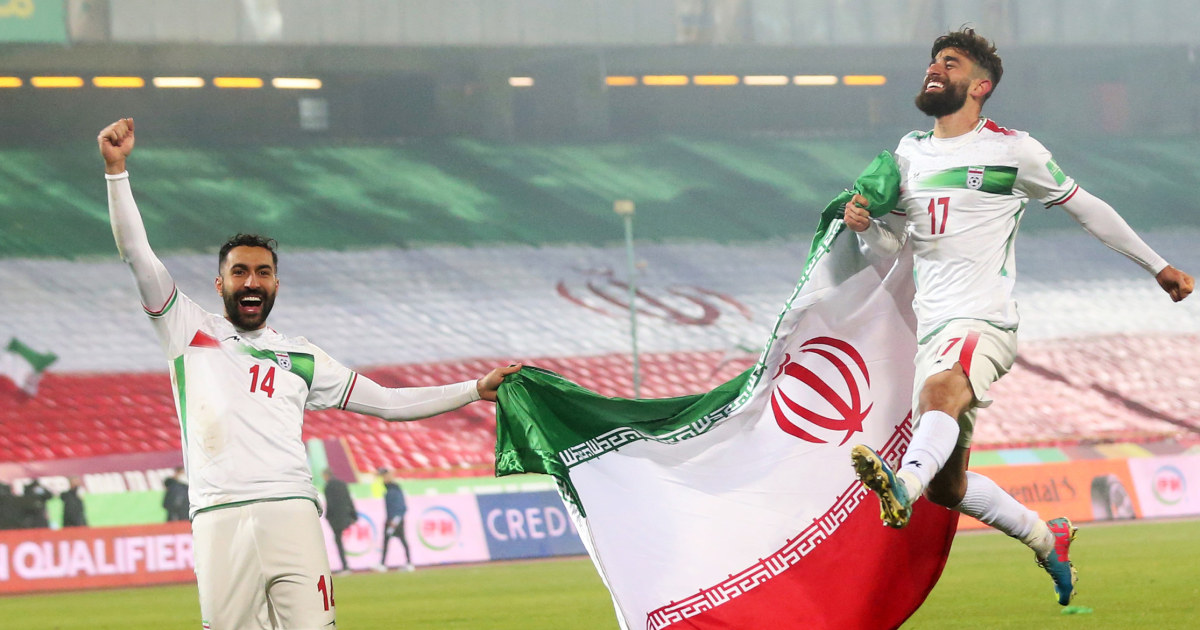On Saturday, 32 national soccer teams are gathering in Qatar for the start of the FIFA World Cup. Among these nations is Iran, whose group draw includes England, Wales and the United States. These Western teams can expect to receive help from the unlikeliest of sources — Iranians themselves. If many of them have their way, they will convince FIFA not to allow their own national team to participate.
Amid the current protests, regime officials and supporters have threatened soccer players for supporting protesters.
The Iranian people are hardly self-hating soccer fans. But a coalition of Iranian athletes is opposing the Islamic regime’s brutal crackdown on citizen protests and the treatment of women by calling for Iran to be banned from the international sporting event.
The widespread demonstrations were sparked by the death of Mahsa Amini, a 22-year-old woman who died in custody on Sep. 16 after the morality police arrested her for not properly wearing a hijab. The outrage has only continued in recent weeks, and it intensified when the Iranian parliament issued a letter of support for harsh punishment of protesters. Already, according to an Iranian news agency, at least one Iranian has been preliminarily sentenced to death in connection with the anti-regime protests.
Sadly, professional athletes are no exception to the Islamic regime’s brutality against their own people. The demonstrators are calling for FIFA to disallow their beloved “Team Melli” in order to call attention to a regime that hasn’t allowed women to watch soccer games, forces its female competitors to wear hijabs, prohibits its athletes from competing against Israelis and threatens those who don’t support its agenda with imprisonment, torture and even execution.
Amid the current protests, regime officials and supporters have threatened soccer players for supporting protesters and subjected the competitive climber Elnaz Rekabi to house arrest for competing without a hijab.
This is hardly a new phenomenon, however. In 2020, the regime executed wrestler Navid Afkari for participating in anti-regime protests in 2018. The year before that, Iranian judoka Saeid Mollaei fled the country after the ayatollahs forced him to withdraw from the Tokyo World Championships before facing the Israeli Sagi Muki. And in 2012, the regime hanged the professional kickboxer Majid Jamali-Fashi, alleging he worked for the Mossad, Israel’s intelligence agency.
Tragically, the Iranian regime’s intimidation and murder of athletes stretches back much further. In 1988, Foruzan Abdi, captain of the women’s national volleyball team, was hanged after spending more than five years in prison for opposing the regime. That same year, Mahshid Razaghi, who played for the Olympic soccer team, was executed for selling anti-government newspapers. In 1984, Habib Khabiri, a member of the men’s national soccer team, was executed by firing squad for membership in an anti-regime organization. In 1981, the Olympic wrestler Hooshang Montazeralzohoor also died by firing squad for membership in an anti-regime organization — alongside 29 others.
But Iran’s offenses in the realm of sports go beyond the persecution of athletes; the regime has used the international sporting arena to sanitize the U.S.-designated terrorist group the Islamic Revolutionary Guard Corps, which was established to protect the power of the Islamic regime, as opposed to the Iranian military that protects the country’s borders.
In the 2020 Tokyo Olympics, Iran’s Javad Foroughi, a member of the Revolutionary Guard, won a gold medal in shooting. Similarly, the head of the Olympic Committee in Iran, Mahmoud Khosravi Wafa, has served in the guard as well as being the former bodyguard of the Ayatollah Khamenei.

The Islamic regime also persecutes fans inside Iran. In line with the government’s gender apartheid policies, women are forbidden from even attending domestic soccer matches and have been physically beaten and pepper-sprayed by regime forces for trying to attend matches for which they had purchased tickets.
Iran’s athletes should be protected, not persecuted. If FIFA can ban Russia from participating in the World Cup over the invasion of Ukraine, then it must act against the Islamic regime’s 40 years of oppressing its athletes — and against the murder, torture and oppression of teenagers and even schoolchildren who are protesting against the regime in the streets of Iran today.
Preventing Iran from participating in the World Cup would send a concrete message that regimes that persecute their own athletes have no place in world sporting organizations. While such a ban would mean Iranian athletes can’t participate in this World Cup, many in Iran believe the team isn’t representative of the people of Iran in the first place but only represents the Islamic regime.
With the World Cup beginning, now is the time for the American soccer community to stand in solidarity with its Iranian counterparts who are bravely risking their lives for liberties and rights that we cherish. Iranian athletes need our support in pressuring FIFA, the International Olympic Committee and all other international sporting bodies to hold the Iranian Islamic regime accountable for its crimes against its own athletes.
Share your story or advertise with us: Whatsapp: +2347068606071 Email: info@newspotng.com














